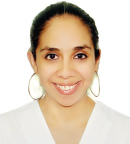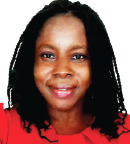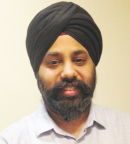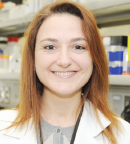Physicians and nurses in low- and middle-income countries (LMICs) have fewer training opportunities, limited medical and educational resources, and insufficient palliative care options for their patients,1 all while these regions are leading the world in new cases of cancer diagnosis.2 An emerging grant from Conquer Cancer®, the ASCO Foundation, aims to reduce disparities in care to better serve doctors and patients.
The International Innovation Grant (IIG), a 1-year award of up to $20,000 given to a nonprofit organization or government agency, provides research funding to support novel, innovative projects with the potential to reduce cancer burdens in LMICs.

Linus Chuang, MD
“The idea for the IIG was born in 2011, when ASCO’s inaugural Leadership Development Program class was tasked with making a positive impact on cancer prevention and control in LMICs,” said Linus Chuang, MD, Chair of the IIG Subcommittee. “Since 2014, 20 grants have been awarded across five continents. Our hope is that recipients will recreate the program in other resource-limited areas to expand the award’s reach.”
Below, four recipients share how the IIG is helping their communities overcome challenges to make treatment more efficient and accessible for their patients.
Liliana Vasquez, MD, MSc, AMEROM (Medical Association of Clinical Oncology of Peru), Peru
2017 IIG Project: ONCOpeds (Pediatric-Early-Diagnosis-System): A novel mobile application for early diagnosis and referral in childhood cancer
“In Peru, delayed time to diagnosis and late referral is an important problem,” said Dr. Vasquez. “Likewise, early diagnosis of cancer has been associated with a reduced risk of childhood mortality. Thanks to the grant support from Conquer Cancer and ASCO, we could create and implement ONCOpeds, which is a smartphone-based app that serves as a targeted intervention in primary/secondary health aimed to decrease overall time to diagnosis and advanced presentation in childhood cancer in Peru.”

Liliana Vasquez, MD, MSc
Physicians can upload relevant clinical findings to the app and request a consultation from a pediatric oncology expert, who will then review the case and advise the physician on further steps. Dr. Vasquez plans to implement the app in 24 regions of Peru over the next 3 years.
Tonia Onyeka, MBBS, College of Medicine, University of Nigeria Enugu Campus, Nigeria
2017 IIG Project: Enhancing palliative care in rural southeast Nigeria: Use of an app for symptom management
There are several barriers to providing quality palliative care in Africa, including staff shortages, difficulty in traveling to patients’ homes, and infrastructure deficiencies due to poverty.
“Our palliative care team had been demoralized by these issues and brainstormed for months on end to find solutions to the problems,” said Dr. Onyeka. “We had many of our patients living in rural areas and in areas distant from our hospital.”

Tonia Onyeka, MBBS
Difficulty following up with patients often led to poor compliance with prescribed medications. “A lot of the time, patients ended up deteriorating or dying before they could get our help or any other medical help,” said Dr. Onyeka.
In response to these issues, Dr. Onyeka and her team developed a mobile application, the EPAC (Enhancing Palliative Care) app, that allowed their patients to monitor their symptoms. The purpose of her IIG project was to determine if the app would encourage compliance with follow-up visits, aid in symptom management, and improve quality of life for the patient and caregiver.
“I consider ASCO and Conquer Cancer visionary in creating this grant opportunity that allows for the development of innovative and dynamic ways to promote cancer care and cancer control in Africa as well as in other [low-resource] countries of the world,” said Dr. Onyeka. “The IIG is in a special class all by itself, as it inspires home-grown solutions for…cancer control problems in LMICs and, at the same time, enhances career development of recipients.”
Ramandeep Singh Arora, MBBS, MD, CanKids...KidsCan, India
2016 IIG Project: A multisite prospective study to determine household out-of-pocket expenditure incurred by families of children newly diagnosed with cancer in India (HOPE Study)
“Diagnosis of cancer in a child places considerable economic burden on families,” said Dr. Arora. “The health expenditures may be more catastrophic in resource-limited countries such as India, where gross domestic product spending on health is just over 1%, and financing of treatment is usually out-of-pocket. Consequently, parents may abandon their child’s cancer treatment to ensure the financial sustainability of the family. Research in this area is mostly from resource-rich countries, and out-of-pocket expenditure burden remains unknown in India.”

Ramandeep Singh Arora, MBBS, MD
The focus of Dr. Arora’s study was to determine the costs incurred by families of children newly diagnosed with cancer, and how demographic, disease-related, treatment-related, and center-related factors played a role. Dr. Arora aimed to understand the nature of the costs, their impact on families, and the role of governmental and nongovernmental organization assistance.
“Out-of-pocket costs remain a challenge for most of the families in LMICs,” said Dr. Arora. “Our study will provide valuable information to health-care professionals and researchers across the world.”
Raya Saab, MD, American University of Beirut Medical Center, Lebanon
2017 IIG Project: Targeted education for general practitioners with development and application of a workflow for rapid second opinion to promote early diagnosis and referral of children with suspected solid tumors
In Lebanon, many children with advanced cancers that initially saw a health-care professional were not diagnosed until the disease had reached a later stage.

Raya Saab, MD
“The project aimed to address the issue of delayed childhood cancer diagnosis through promoting childhood cancer diagnosis awareness among primary care providers, along with the establishment of a rapid referral process for children suspected to have cancer,” said Dr. Saab. “The results from this study shed light on several areas in which pediatricians feel they lack sufficient knowledge. They include specific guidelines for consideration and screening of pediatric cancer predisposition disorders, as well as general diagnostic considerations in children with suspected malignancy.”
Awareness sessions focusing on childhood cancer symptoms, as well as financial aid opportunities, will soon be planned across the country for both parents and the general public. ■
For more information on the IIG, please visit conquer.org/international-innovation-grants3.
© 2019. American Society of Clinical Oncology. All rights reserved.
REFERENCES
1. Patel JD, Galsky MD, Chagpar AB, et al: Role of American Society of Clinical Oncology in low- and middle-income countries. J Clin Oncol 29:3097-3102, 2011.
2. International Agency for Research on Cancer. World Cancer Report 2014. Available at who.int/cancer/publications/WRC_2014/en/. Accessed June 24, 2019.

